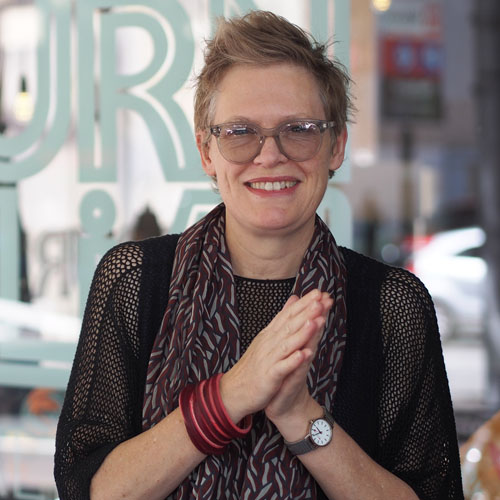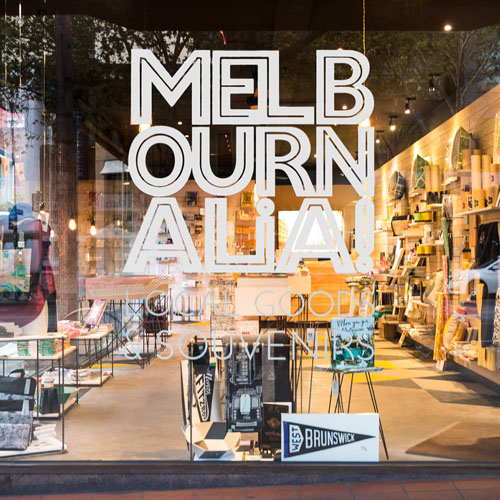Melbournalia

When you’re in a crowded market, it’s important to find a way to stand out.
Giftware and Melbourne souvenir shop, Melbournalia, has managed to do this by telling a local story. From pop-up shop gem to CBD darling at the top of Bourke St, the shop appeals in equal measures to locals looking for cute gifts as to international customers hunting for the perfect token to take home.
We interviewed owner Jenny Brown about how she balances her audiences while telling a unique local Melbourne story with every piece in her shop.
You started as a pop-up concept store, setting up shop in various cafes and markets around Melbourne. How did you find these opportunities?
For us, it was about contacts – calling on people we knew, being involved with a particular community. A couple of the places were from friends of friends, but most of them were people I knew professionally.
What led you to the decision to set up shop in a permanent location?
A few things.
We imagined it would work, and after the pop-ups, we had pretty concrete evidence there was a market for what we were trying to do. It was a passion project. It was an idea that I and my then business partners were very attracted to: telling stories about the city.
The other decision that sealed the deal was being approved for a Melbourne City Council small business start-up grant.
Your store is positioned as a more boutique brand than other gift stores in the CBD, how do you maintain this positioning?
One is that we like to say we’re in the business of telling stories, first and foremost. Everything we sell has a story about Melbourne or the people who made it, so that’s important. It also gives us a sense of authenticity that perhaps sets us apart.
We’re also somewhat ethically-driven. There are certain things we like to include in our product mix, and if they are ethically made and if there is a good, ethical story (whether it's a social cause, or an environmentally friendly element), then I would choose those products over another that didn’t have the story.

When it comes to tourist versus local traffic, what sort of split do you see here, both in store and online?
We have 3 separate markets. It’s people who live and work in the city and a lot of people will come and buy a gift, especially going away gifts. Friday morning is the day, we have oodles of people who come in with an envelope full of change, which I love because I don’t have to go to the bank to get change.
There are also people who live in greater Melbourne who have visitors coming from interstate and overseas or are going themselves.
The third sector is people who are visiting Melbourne who come across us and want to take something home. International customers won’t buy anything too big to take home, so there’s that consideration. It’s a growing market and we do need to do a lot more to be in it, but that’s an area that we’re looking to develop more and respond to better.
In terms of targeting these audiences, I do market to them a little differently, but there's tons of crossover.
How do you generate traffic?
We haven’t done a lot of traditional advertising. In fact, we’ve barely paid for advertising at all. It’s never been that successful. What we do is social media, where we’ve developed quite good, repetitive practices and a high standard.
The other thing is good customer service, which I think is one of your leading cards for repeat customers and word of mouth.
Our windows are very important too. We’re very lucky in that we’re on a corner, and we’re all windows, so people can see in. At night, we’re lit up and look like a little jewellery box, which is lovely. Because we’re in a high-traffic area, we get a lot of people seeing us and coming back.
We get some online sales, but it’s tiny in comparison to our over-the-counter sales. The way our website is built, it’s a great catalogue for people to browse.
How much of your traffic is seasonal, and how do you manage the ebb and flow of business during peaks and lulls in tourism?
The first couple of years, we were flying a little bit blind. I had an idea of what would happen after spending 10 years in retail, but things changed. January used to be a quiet period in retail, and our first January was an absolute disaster. It was really, really hot, and we weren’t well-known. The next few years were a lot better, we're appearing more in Google searches. So people who were in town for the tennis would come to see us and keep business busy.
Lately, we've been trying a few online offers like free or discounted postage, which seemed to work quite well. What we lost in paying for postage, we made up for in the increased orders.
One thing that’s important is learning what people want at certain times of the year. A lot of things we’ve found that we’ve been in the right place at the right time. You get to learn your audience and predict what they want, which you can only pick up through experience. We try to listen as much as we can, and respond in turn.
How has the way you market changed over time, and with ongoing learnings?
We were approached by a local Japanese-language magazine which is widely read by a lot of expats. They came in and took some beautiful photos. This market was a surprise! We responded to the surge in that market with a lot of small or organic products, things that suited younger people and students, such as tote bags, postcards, and then we’ve found food does well with the Japanese market. Research told us that food was a good option for gift-giving.
Something else I found surprising was the influx of theatre-goers in the area who come in. So we’re in the middle of the theatre district here, and I found that, particularly in winter evenings, we’d get a lot of people who weren’t used to standing around on the street in a Melbourne winter, who had a bit of time to kill before or after the show, and would purchase knitwear. That prompted us to do 2 things: to stock up on knitwear, which has a great price point and also to extend opening hours, especially over the winter months.
What is the best or most practical business advice you’ve ever received, and how do you implement this in your business?
Somebody once told me about the value of working on your business, as opposed to just in your business. Although the first few years I worked in the store, on the floor – and that’s important, you do need to do that – but the idea of working on your business is good. Pulling back and getting an overview of things like marketing and strategy.
The other thing is to learn to delegate. I heard about a female CEO who said her biggest strength is in finding the right people to do things better than you can do them yourself. There’s an element of micromanaging in small business, but learning to delegate has been a salient lesson for me.
Lastly, why did you land on “Melbournalia"?
It comes from "et alia" which means “all of the above” or “all that that encompasses.” It’s based on the idea of Melbourne… and everything else. It’s the idea of the memento, the collection of Melbourne.